Unilever Leadership and Management: Roles, Operations, and Environment
VerifiedAdded on 2022/12/28
|16
|5192
|86
Report
AI Summary
This report provides a comprehensive analysis of leadership and management, focusing on the distinctions between leaders and managers, their respective roles, and the characteristics that define them. The report uses Unilever Plc as a case study to illustrate these concepts, examining how leaders and managers function in various situations, such as maintaining reputation, recruiting talent, and managing technology and employee turnover. It explores different leadership styles, including transactional and transformational approaches, and their impact on operational management. Furthermore, the report delves into the key approaches to operational management and the significance of its role in achieving business objectives. Finally, it analyzes the influence of various factors within the business environment on operational management and the decision-making processes of leaders and managers. The report provides a thorough overview of the subject, offering insights into the practical application of leadership and management principles within a real-world business context.
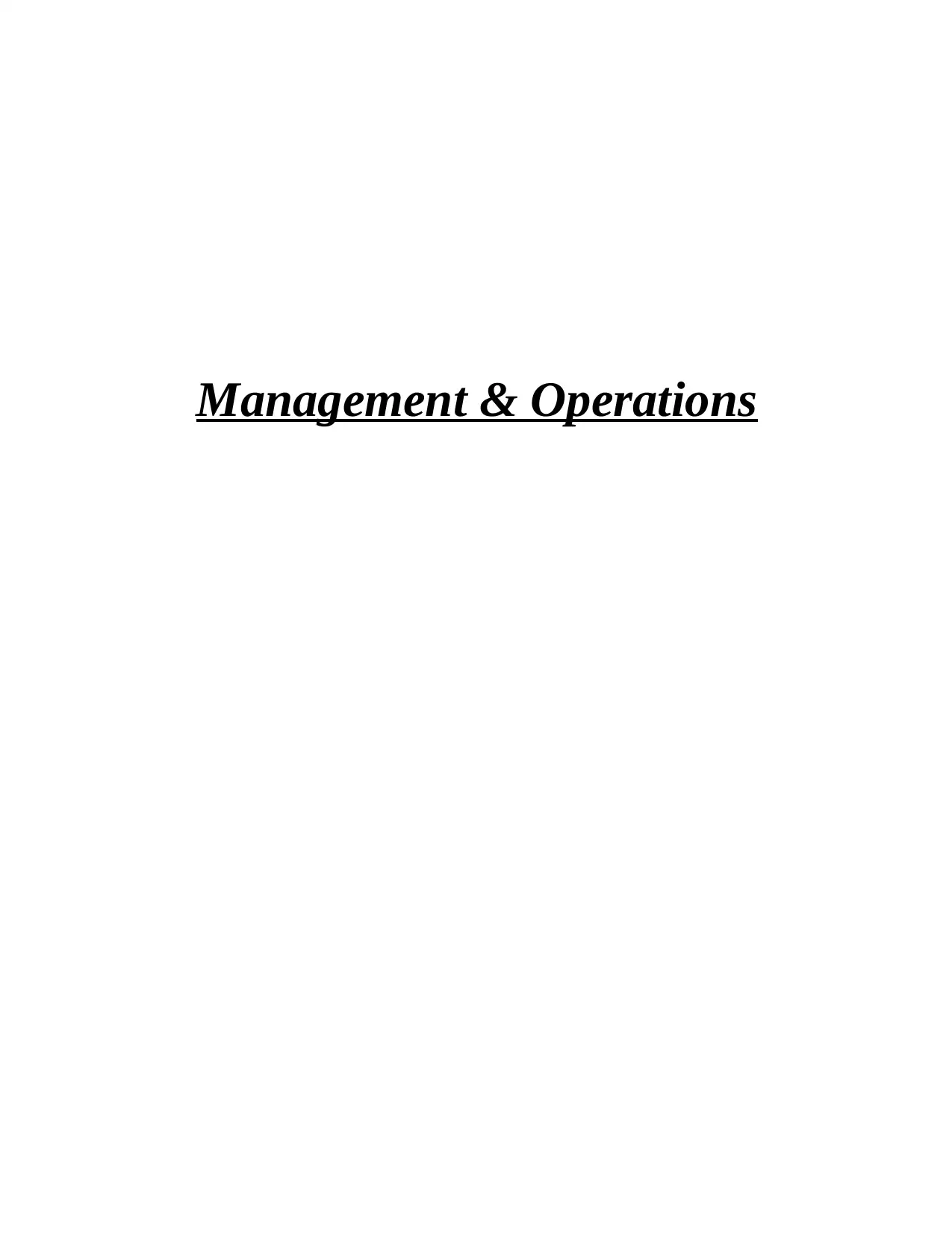
Management & Operations
Paraphrase This Document
Need a fresh take? Get an instant paraphrase of this document with our AI Paraphraser
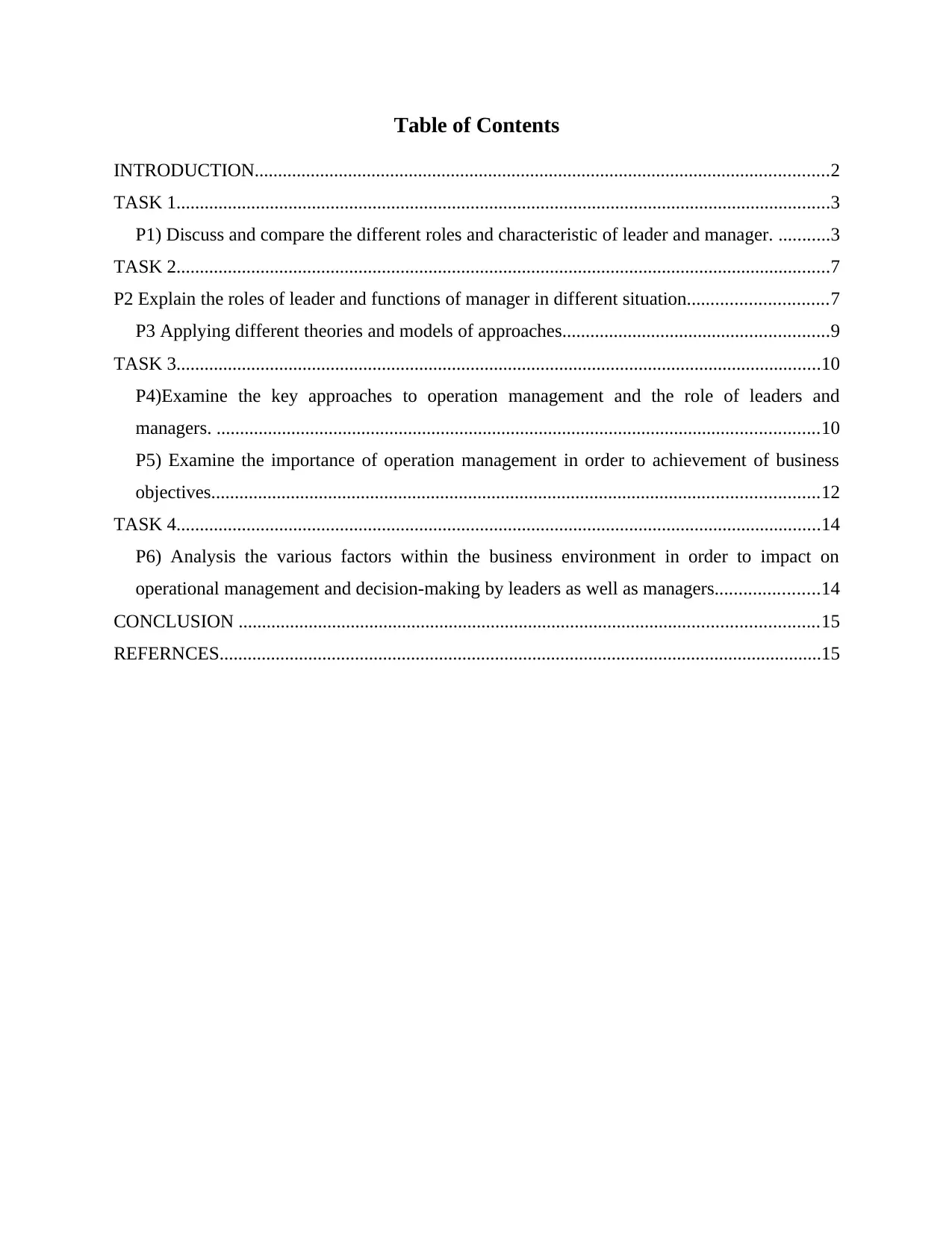
Table of Contents
INTRODUCTION...........................................................................................................................2
TASK 1............................................................................................................................................3
P1) Discuss and compare the different roles and characteristic of leader and manager. ...........3
TASK 2............................................................................................................................................7
P2 Explain the roles of leader and functions of manager in different situation..............................7
P3 Applying different theories and models of approaches.........................................................9
TASK 3..........................................................................................................................................10
P4)Examine the key approaches to operation management and the role of leaders and
managers. .................................................................................................................................10
P5) Examine the importance of operation management in order to achievement of business
objectives..................................................................................................................................12
TASK 4..........................................................................................................................................14
P6) Analysis the various factors within the business environment in order to impact on
operational management and decision-making by leaders as well as managers......................14
CONCLUSION ............................................................................................................................15
REFERNCES.................................................................................................................................15
INTRODUCTION...........................................................................................................................2
TASK 1............................................................................................................................................3
P1) Discuss and compare the different roles and characteristic of leader and manager. ...........3
TASK 2............................................................................................................................................7
P2 Explain the roles of leader and functions of manager in different situation..............................7
P3 Applying different theories and models of approaches.........................................................9
TASK 3..........................................................................................................................................10
P4)Examine the key approaches to operation management and the role of leaders and
managers. .................................................................................................................................10
P5) Examine the importance of operation management in order to achievement of business
objectives..................................................................................................................................12
TASK 4..........................................................................................................................................14
P6) Analysis the various factors within the business environment in order to impact on
operational management and decision-making by leaders as well as managers......................14
CONCLUSION ............................................................................................................................15
REFERNCES.................................................................................................................................15
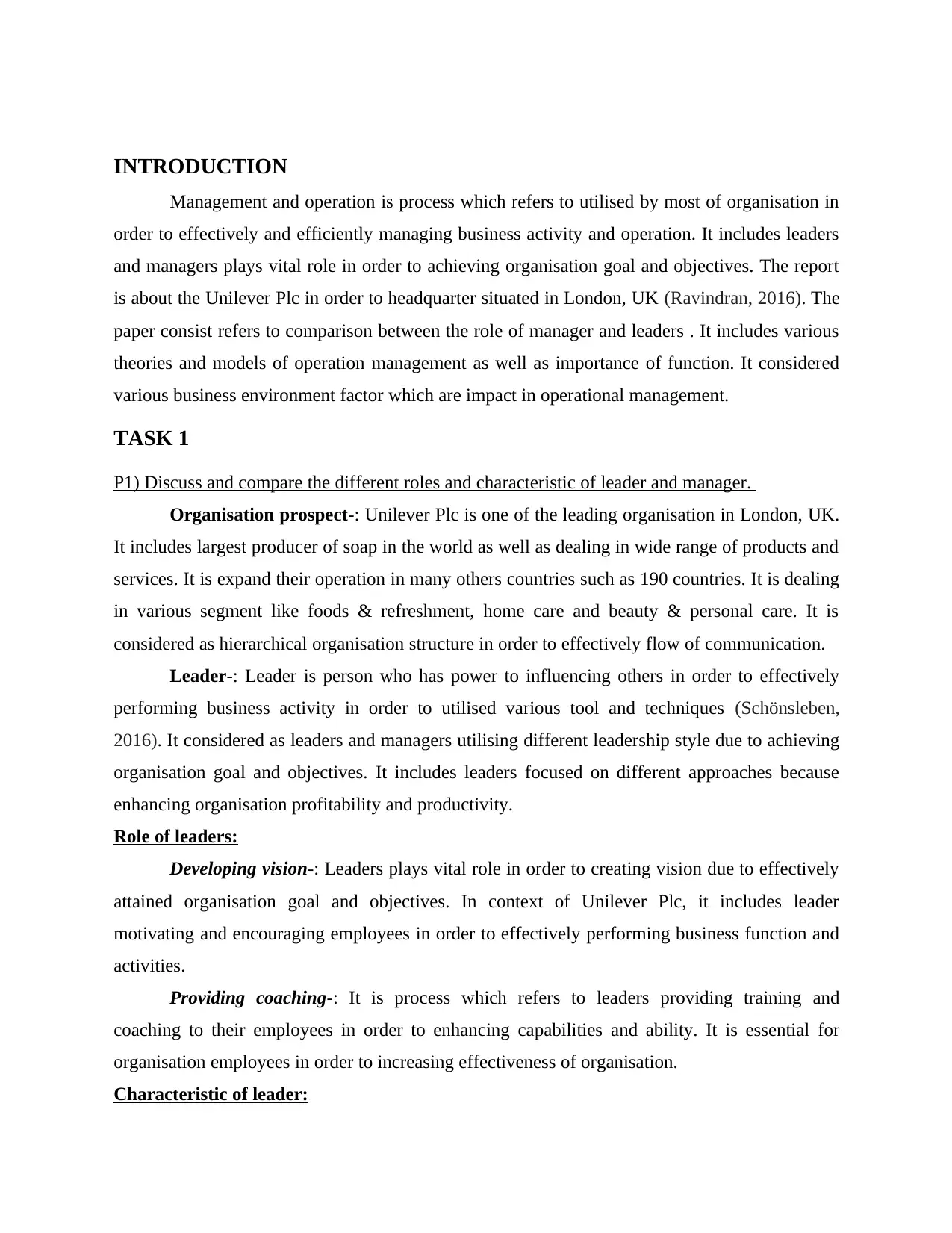
INTRODUCTION
Management and operation is process which refers to utilised by most of organisation in
order to effectively and efficiently managing business activity and operation. It includes leaders
and managers plays vital role in order to achieving organisation goal and objectives. The report
is about the Unilever Plc in order to headquarter situated in London, UK (Ravindran, 2016). The
paper consist refers to comparison between the role of manager and leaders . It includes various
theories and models of operation management as well as importance of function. It considered
various business environment factor which are impact in operational management.
TASK 1
P1) Discuss and compare the different roles and characteristic of leader and manager.
Organisation prospect-: Unilever Plc is one of the leading organisation in London, UK.
It includes largest producer of soap in the world as well as dealing in wide range of products and
services. It is expand their operation in many others countries such as 190 countries. It is dealing
in various segment like foods & refreshment, home care and beauty & personal care. It is
considered as hierarchical organisation structure in order to effectively flow of communication.
Leader-: Leader is person who has power to influencing others in order to effectively
performing business activity in order to utilised various tool and techniques (Schönsleben,
2016). It considered as leaders and managers utilising different leadership style due to achieving
organisation goal and objectives. It includes leaders focused on different approaches because
enhancing organisation profitability and productivity.
Role of leaders:
Developing vision-: Leaders plays vital role in order to creating vision due to effectively
attained organisation goal and objectives. In context of Unilever Plc, it includes leader
motivating and encouraging employees in order to effectively performing business function and
activities.
Providing coaching-: It is process which refers to leaders providing training and
coaching to their employees in order to enhancing capabilities and ability. It is essential for
organisation employees in order to increasing effectiveness of organisation.
Characteristic of leader:
Management and operation is process which refers to utilised by most of organisation in
order to effectively and efficiently managing business activity and operation. It includes leaders
and managers plays vital role in order to achieving organisation goal and objectives. The report
is about the Unilever Plc in order to headquarter situated in London, UK (Ravindran, 2016). The
paper consist refers to comparison between the role of manager and leaders . It includes various
theories and models of operation management as well as importance of function. It considered
various business environment factor which are impact in operational management.
TASK 1
P1) Discuss and compare the different roles and characteristic of leader and manager.
Organisation prospect-: Unilever Plc is one of the leading organisation in London, UK.
It includes largest producer of soap in the world as well as dealing in wide range of products and
services. It is expand their operation in many others countries such as 190 countries. It is dealing
in various segment like foods & refreshment, home care and beauty & personal care. It is
considered as hierarchical organisation structure in order to effectively flow of communication.
Leader-: Leader is person who has power to influencing others in order to effectively
performing business activity in order to utilised various tool and techniques (Schönsleben,
2016). It considered as leaders and managers utilising different leadership style due to achieving
organisation goal and objectives. It includes leaders focused on different approaches because
enhancing organisation profitability and productivity.
Role of leaders:
Developing vision-: Leaders plays vital role in order to creating vision due to effectively
attained organisation goal and objectives. In context of Unilever Plc, it includes leader
motivating and encouraging employees in order to effectively performing business function and
activities.
Providing coaching-: It is process which refers to leaders providing training and
coaching to their employees in order to enhancing capabilities and ability. It is essential for
organisation employees in order to increasing effectiveness of organisation.
Characteristic of leader:
⊘ This is a preview!⊘
Do you want full access?
Subscribe today to unlock all pages.

Trusted by 1+ million students worldwide
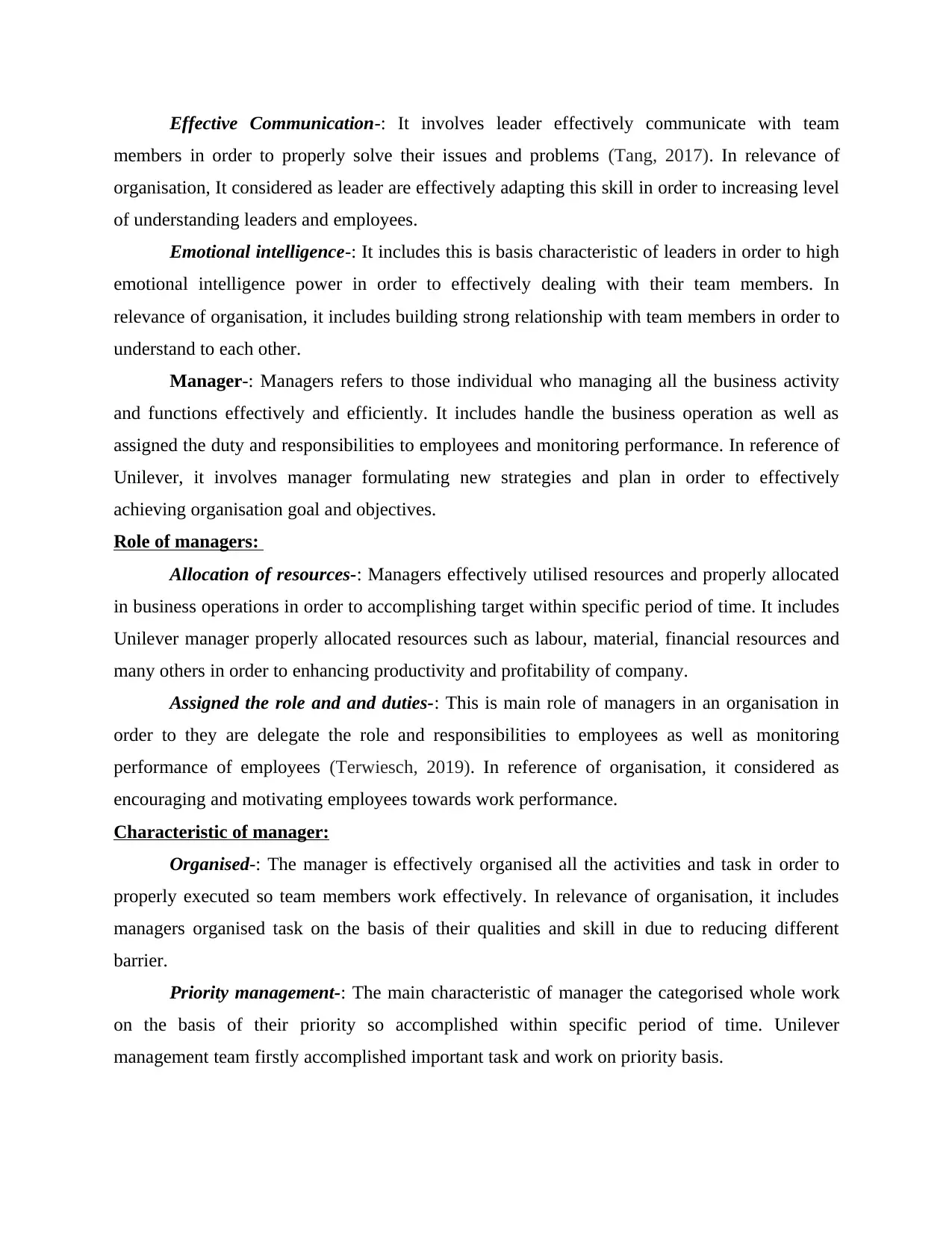
Effective Communication-: It involves leader effectively communicate with team
members in order to properly solve their issues and problems (Tang, 2017). In relevance of
organisation, It considered as leader are effectively adapting this skill in order to increasing level
of understanding leaders and employees.
Emotional intelligence-: It includes this is basis characteristic of leaders in order to high
emotional intelligence power in order to effectively dealing with their team members. In
relevance of organisation, it includes building strong relationship with team members in order to
understand to each other.
Manager-: Managers refers to those individual who managing all the business activity
and functions effectively and efficiently. It includes handle the business operation as well as
assigned the duty and responsibilities to employees and monitoring performance. In reference of
Unilever, it involves manager formulating new strategies and plan in order to effectively
achieving organisation goal and objectives.
Role of managers:
Allocation of resources-: Managers effectively utilised resources and properly allocated
in business operations in order to accomplishing target within specific period of time. It includes
Unilever manager properly allocated resources such as labour, material, financial resources and
many others in order to enhancing productivity and profitability of company.
Assigned the role and and duties-: This is main role of managers in an organisation in
order to they are delegate the role and responsibilities to employees as well as monitoring
performance of employees (Terwiesch, 2019). In reference of organisation, it considered as
encouraging and motivating employees towards work performance.
Characteristic of manager:
Organised-: The manager is effectively organised all the activities and task in order to
properly executed so team members work effectively. In relevance of organisation, it includes
managers organised task on the basis of their qualities and skill in due to reducing different
barrier.
Priority management-: The main characteristic of manager the categorised whole work
on the basis of their priority so accomplished within specific period of time. Unilever
management team firstly accomplished important task and work on priority basis.
members in order to properly solve their issues and problems (Tang, 2017). In relevance of
organisation, It considered as leader are effectively adapting this skill in order to increasing level
of understanding leaders and employees.
Emotional intelligence-: It includes this is basis characteristic of leaders in order to high
emotional intelligence power in order to effectively dealing with their team members. In
relevance of organisation, it includes building strong relationship with team members in order to
understand to each other.
Manager-: Managers refers to those individual who managing all the business activity
and functions effectively and efficiently. It includes handle the business operation as well as
assigned the duty and responsibilities to employees and monitoring performance. In reference of
Unilever, it involves manager formulating new strategies and plan in order to effectively
achieving organisation goal and objectives.
Role of managers:
Allocation of resources-: Managers effectively utilised resources and properly allocated
in business operations in order to accomplishing target within specific period of time. It includes
Unilever manager properly allocated resources such as labour, material, financial resources and
many others in order to enhancing productivity and profitability of company.
Assigned the role and and duties-: This is main role of managers in an organisation in
order to they are delegate the role and responsibilities to employees as well as monitoring
performance of employees (Terwiesch, 2019). In reference of organisation, it considered as
encouraging and motivating employees towards work performance.
Characteristic of manager:
Organised-: The manager is effectively organised all the activities and task in order to
properly executed so team members work effectively. In relevance of organisation, it includes
managers organised task on the basis of their qualities and skill in due to reducing different
barrier.
Priority management-: The main characteristic of manager the categorised whole work
on the basis of their priority so accomplished within specific period of time. Unilever
management team firstly accomplished important task and work on priority basis.
Paraphrase This Document
Need a fresh take? Get an instant paraphrase of this document with our AI Paraphraser
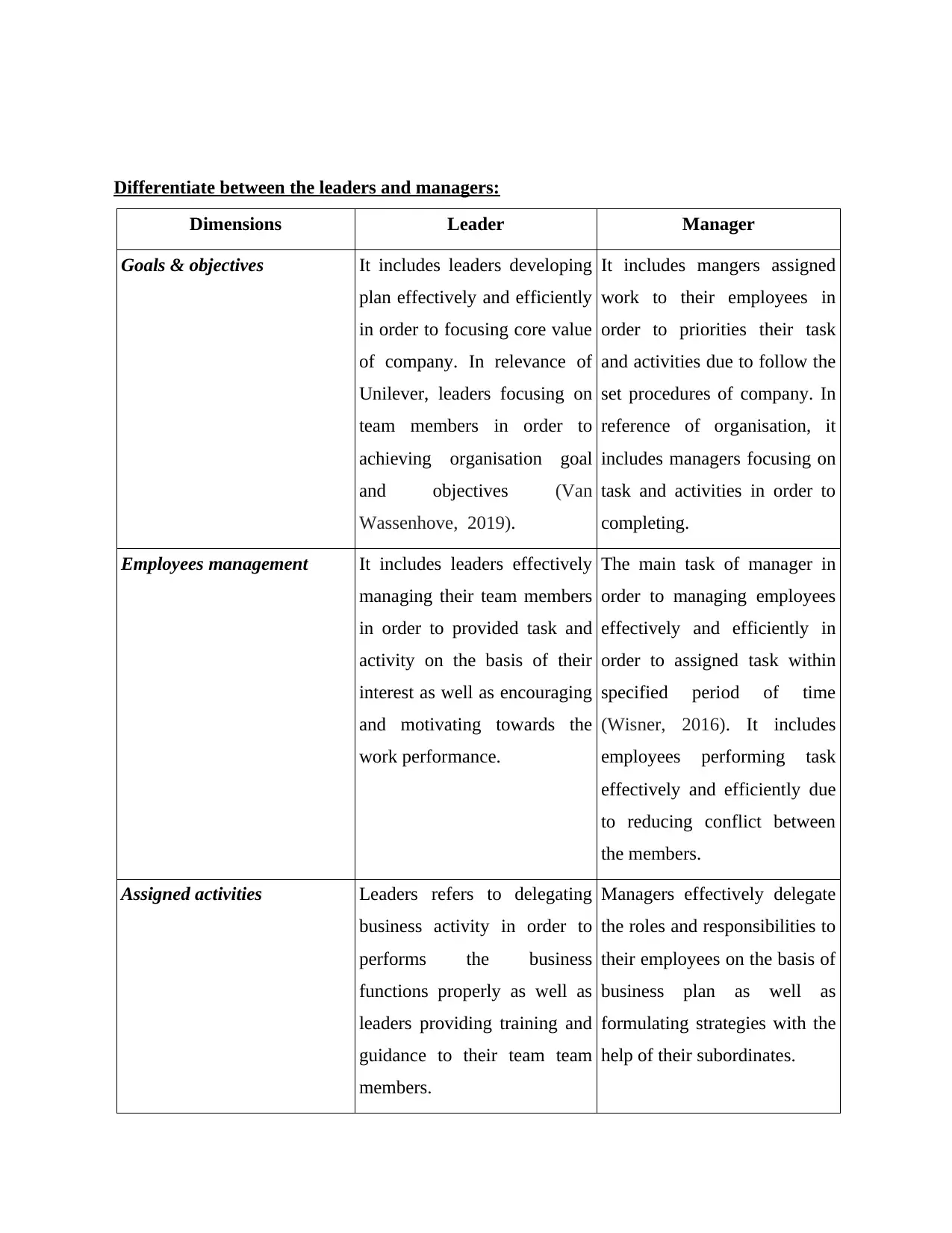
Differentiate between the leaders and managers:
Dimensions Leader Manager
Goals & objectives It includes leaders developing
plan effectively and efficiently
in order to focusing core value
of company. In relevance of
Unilever, leaders focusing on
team members in order to
achieving organisation goal
and objectives (Van
Wassenhove, 2019).
It includes mangers assigned
work to their employees in
order to priorities their task
and activities due to follow the
set procedures of company. In
reference of organisation, it
includes managers focusing on
task and activities in order to
completing.
Employees management It includes leaders effectively
managing their team members
in order to provided task and
activity on the basis of their
interest as well as encouraging
and motivating towards the
work performance.
The main task of manager in
order to managing employees
effectively and efficiently in
order to assigned task within
specified period of time
(Wisner, 2016). It includes
employees performing task
effectively and efficiently due
to reducing conflict between
the members.
Assigned activities Leaders refers to delegating
business activity in order to
performs the business
functions properly as well as
leaders providing training and
guidance to their team team
members.
Managers effectively delegate
the roles and responsibilities to
their employees on the basis of
business plan as well as
formulating strategies with the
help of their subordinates.
Dimensions Leader Manager
Goals & objectives It includes leaders developing
plan effectively and efficiently
in order to focusing core value
of company. In relevance of
Unilever, leaders focusing on
team members in order to
achieving organisation goal
and objectives (Van
Wassenhove, 2019).
It includes mangers assigned
work to their employees in
order to priorities their task
and activities due to follow the
set procedures of company. In
reference of organisation, it
includes managers focusing on
task and activities in order to
completing.
Employees management It includes leaders effectively
managing their team members
in order to provided task and
activity on the basis of their
interest as well as encouraging
and motivating towards the
work performance.
The main task of manager in
order to managing employees
effectively and efficiently in
order to assigned task within
specified period of time
(Wisner, 2016). It includes
employees performing task
effectively and efficiently due
to reducing conflict between
the members.
Assigned activities Leaders refers to delegating
business activity in order to
performs the business
functions properly as well as
leaders providing training and
guidance to their team team
members.
Managers effectively delegate
the roles and responsibilities to
their employees on the basis of
business plan as well as
formulating strategies with the
help of their subordinates.
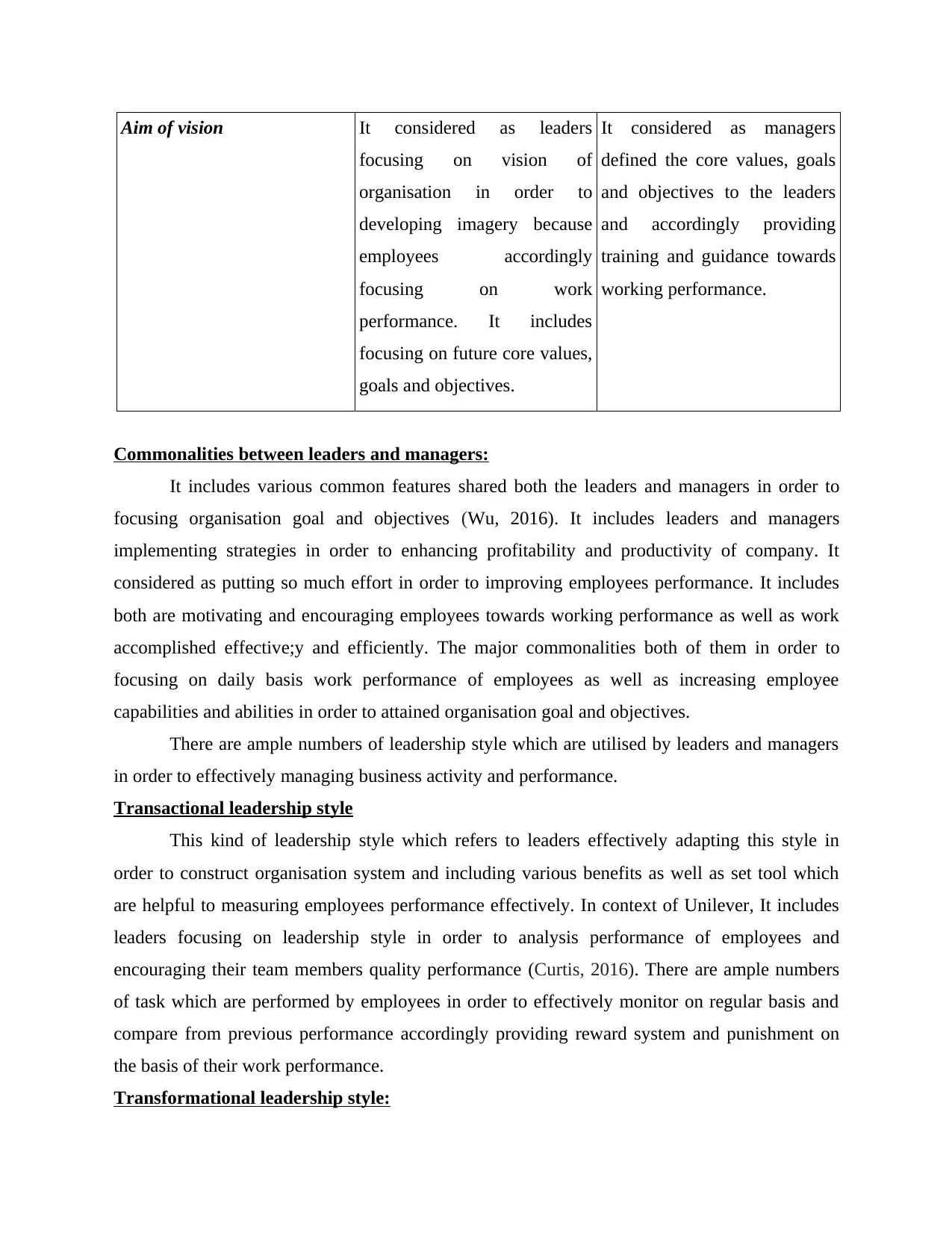
Aim of vision It considered as leaders
focusing on vision of
organisation in order to
developing imagery because
employees accordingly
focusing on work
performance. It includes
focusing on future core values,
goals and objectives.
It considered as managers
defined the core values, goals
and objectives to the leaders
and accordingly providing
training and guidance towards
working performance.
Commonalities between leaders and managers:
It includes various common features shared both the leaders and managers in order to
focusing organisation goal and objectives (Wu, 2016). It includes leaders and managers
implementing strategies in order to enhancing profitability and productivity of company. It
considered as putting so much effort in order to improving employees performance. It includes
both are motivating and encouraging employees towards working performance as well as work
accomplished effective;y and efficiently. The major commonalities both of them in order to
focusing on daily basis work performance of employees as well as increasing employee
capabilities and abilities in order to attained organisation goal and objectives.
There are ample numbers of leadership style which are utilised by leaders and managers
in order to effectively managing business activity and performance.
Transactional leadership style
This kind of leadership style which refers to leaders effectively adapting this style in
order to construct organisation system and including various benefits as well as set tool which
are helpful to measuring employees performance effectively. In context of Unilever, It includes
leaders focusing on leadership style in order to analysis performance of employees and
encouraging their team members quality performance (Curtis, 2016). There are ample numbers
of task which are performed by employees in order to effectively monitor on regular basis and
compare from previous performance accordingly providing reward system and punishment on
the basis of their work performance.
Transformational leadership style:
focusing on vision of
organisation in order to
developing imagery because
employees accordingly
focusing on work
performance. It includes
focusing on future core values,
goals and objectives.
It considered as managers
defined the core values, goals
and objectives to the leaders
and accordingly providing
training and guidance towards
working performance.
Commonalities between leaders and managers:
It includes various common features shared both the leaders and managers in order to
focusing organisation goal and objectives (Wu, 2016). It includes leaders and managers
implementing strategies in order to enhancing profitability and productivity of company. It
considered as putting so much effort in order to improving employees performance. It includes
both are motivating and encouraging employees towards working performance as well as work
accomplished effective;y and efficiently. The major commonalities both of them in order to
focusing on daily basis work performance of employees as well as increasing employee
capabilities and abilities in order to attained organisation goal and objectives.
There are ample numbers of leadership style which are utilised by leaders and managers
in order to effectively managing business activity and performance.
Transactional leadership style
This kind of leadership style which refers to leaders effectively adapting this style in
order to construct organisation system and including various benefits as well as set tool which
are helpful to measuring employees performance effectively. In context of Unilever, It includes
leaders focusing on leadership style in order to analysis performance of employees and
encouraging their team members quality performance (Curtis, 2016). There are ample numbers
of task which are performed by employees in order to effectively monitor on regular basis and
compare from previous performance accordingly providing reward system and punishment on
the basis of their work performance.
Transformational leadership style:
⊘ This is a preview!⊘
Do you want full access?
Subscribe today to unlock all pages.

Trusted by 1+ million students worldwide
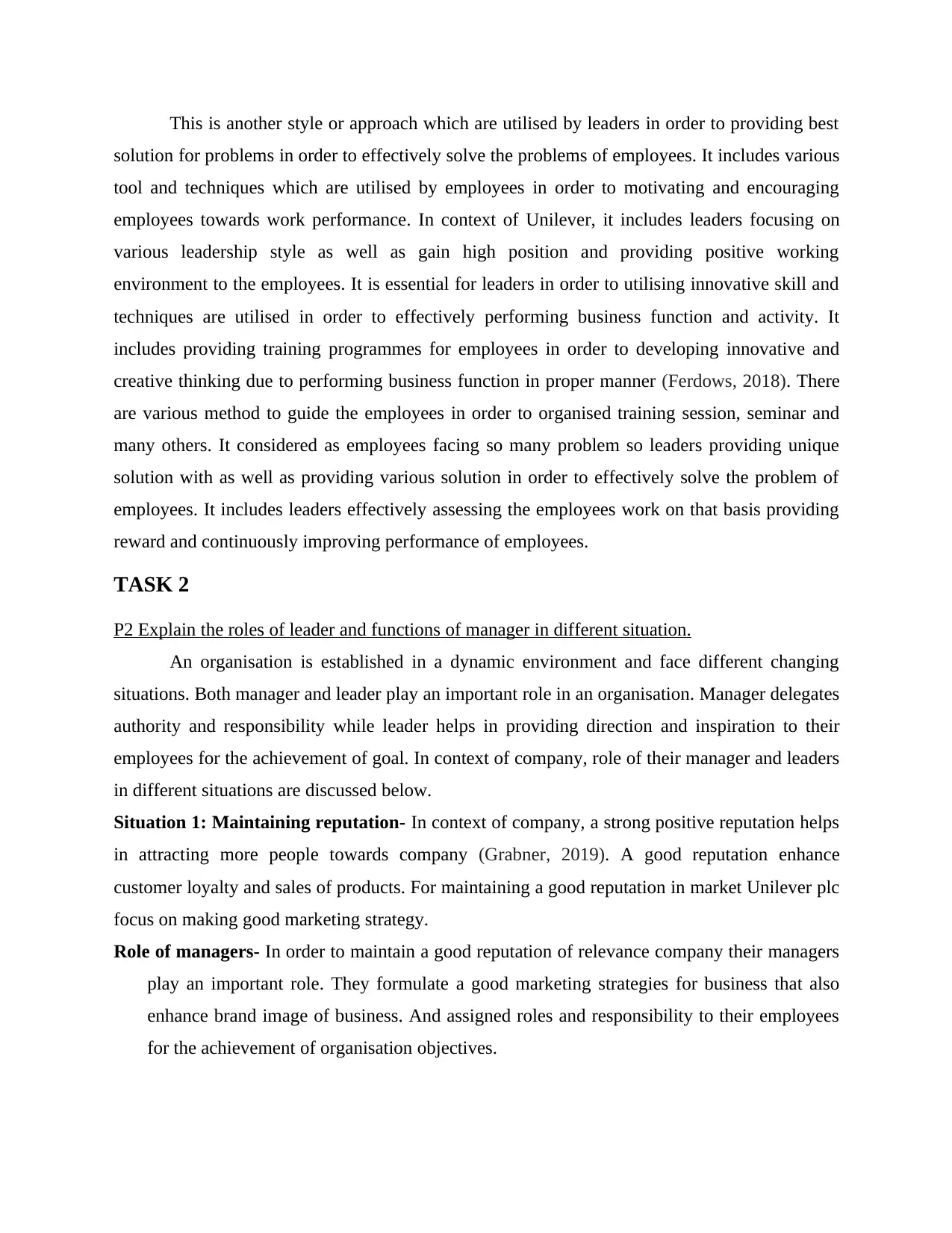
This is another style or approach which are utilised by leaders in order to providing best
solution for problems in order to effectively solve the problems of employees. It includes various
tool and techniques which are utilised by employees in order to motivating and encouraging
employees towards work performance. In context of Unilever, it includes leaders focusing on
various leadership style as well as gain high position and providing positive working
environment to the employees. It is essential for leaders in order to utilising innovative skill and
techniques are utilised in order to effectively performing business function and activity. It
includes providing training programmes for employees in order to developing innovative and
creative thinking due to performing business function in proper manner (Ferdows, 2018). There
are various method to guide the employees in order to organised training session, seminar and
many others. It considered as employees facing so many problem so leaders providing unique
solution with as well as providing various solution in order to effectively solve the problem of
employees. It includes leaders effectively assessing the employees work on that basis providing
reward and continuously improving performance of employees.
TASK 2
P2 Explain the roles of leader and functions of manager in different situation.
An organisation is established in a dynamic environment and face different changing
situations. Both manager and leader play an important role in an organisation. Manager delegates
authority and responsibility while leader helps in providing direction and inspiration to their
employees for the achievement of goal. In context of company, role of their manager and leaders
in different situations are discussed below.
Situation 1: Maintaining reputation- In context of company, a strong positive reputation helps
in attracting more people towards company (Grabner, 2019). A good reputation enhance
customer loyalty and sales of products. For maintaining a good reputation in market Unilever plc
focus on making good marketing strategy.
Role of managers- In order to maintain a good reputation of relevance company their managers
play an important role. They formulate a good marketing strategies for business that also
enhance brand image of business. And assigned roles and responsibility to their employees
for the achievement of organisation objectives.
solution for problems in order to effectively solve the problems of employees. It includes various
tool and techniques which are utilised by employees in order to motivating and encouraging
employees towards work performance. In context of Unilever, it includes leaders focusing on
various leadership style as well as gain high position and providing positive working
environment to the employees. It is essential for leaders in order to utilising innovative skill and
techniques are utilised in order to effectively performing business function and activity. It
includes providing training programmes for employees in order to developing innovative and
creative thinking due to performing business function in proper manner (Ferdows, 2018). There
are various method to guide the employees in order to organised training session, seminar and
many others. It considered as employees facing so many problem so leaders providing unique
solution with as well as providing various solution in order to effectively solve the problem of
employees. It includes leaders effectively assessing the employees work on that basis providing
reward and continuously improving performance of employees.
TASK 2
P2 Explain the roles of leader and functions of manager in different situation.
An organisation is established in a dynamic environment and face different changing
situations. Both manager and leader play an important role in an organisation. Manager delegates
authority and responsibility while leader helps in providing direction and inspiration to their
employees for the achievement of goal. In context of company, role of their manager and leaders
in different situations are discussed below.
Situation 1: Maintaining reputation- In context of company, a strong positive reputation helps
in attracting more people towards company (Grabner, 2019). A good reputation enhance
customer loyalty and sales of products. For maintaining a good reputation in market Unilever plc
focus on making good marketing strategy.
Role of managers- In order to maintain a good reputation of relevance company their managers
play an important role. They formulate a good marketing strategies for business that also
enhance brand image of business. And assigned roles and responsibility to their employees
for the achievement of organisation objectives.
Paraphrase This Document
Need a fresh take? Get an instant paraphrase of this document with our AI Paraphraser
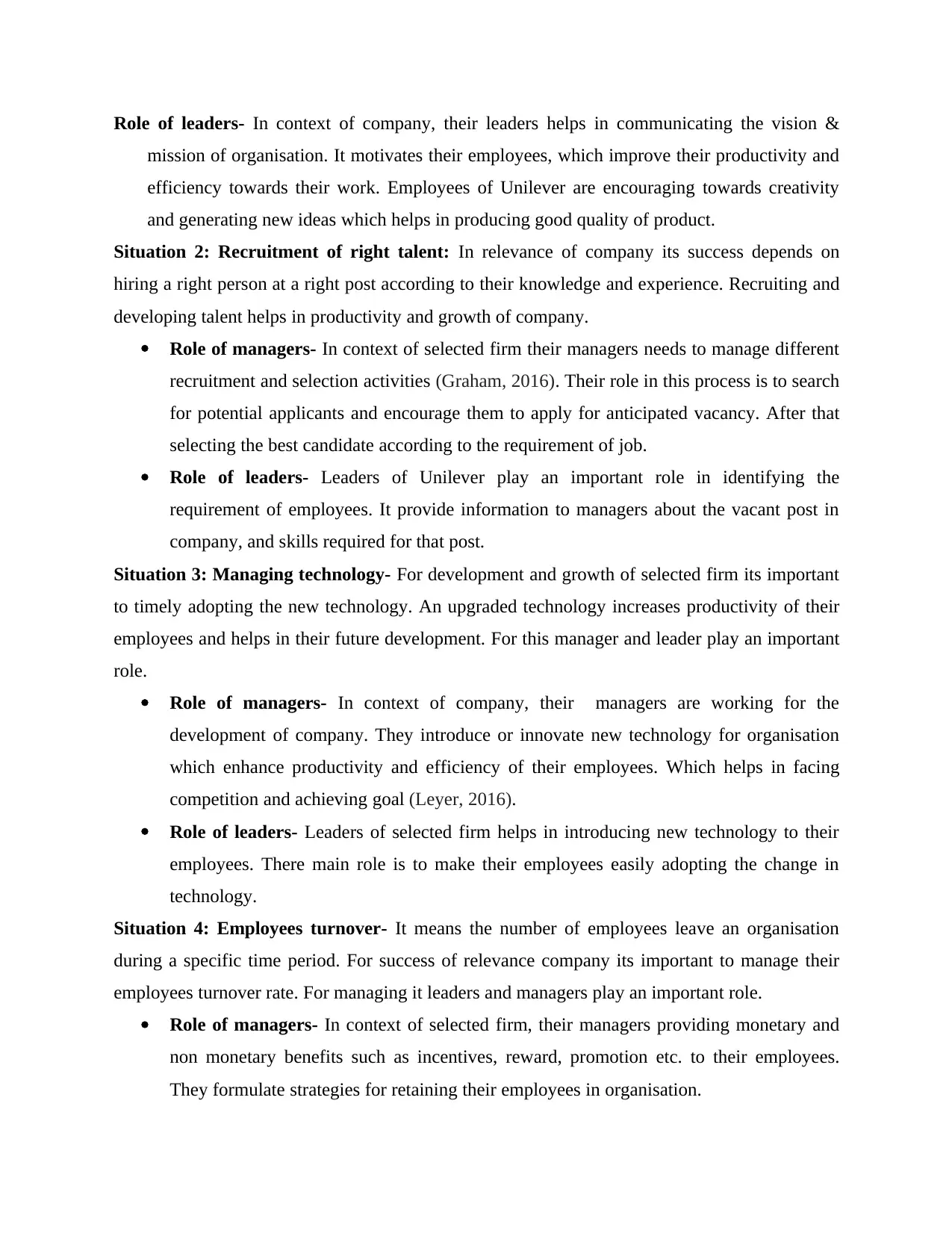
Role of leaders- In context of company, their leaders helps in communicating the vision &
mission of organisation. It motivates their employees, which improve their productivity and
efficiency towards their work. Employees of Unilever are encouraging towards creativity
and generating new ideas which helps in producing good quality of product.
Situation 2: Recruitment of right talent: In relevance of company its success depends on
hiring a right person at a right post according to their knowledge and experience. Recruiting and
developing talent helps in productivity and growth of company.
Role of managers- In context of selected firm their managers needs to manage different
recruitment and selection activities (Graham, 2016). Their role in this process is to search
for potential applicants and encourage them to apply for anticipated vacancy. After that
selecting the best candidate according to the requirement of job.
Role of leaders- Leaders of Unilever play an important role in identifying the
requirement of employees. It provide information to managers about the vacant post in
company, and skills required for that post.
Situation 3: Managing technology- For development and growth of selected firm its important
to timely adopting the new technology. An upgraded technology increases productivity of their
employees and helps in their future development. For this manager and leader play an important
role.
Role of managers- In context of company, their managers are working for the
development of company. They introduce or innovate new technology for organisation
which enhance productivity and efficiency of their employees. Which helps in facing
competition and achieving goal (Leyer, 2016).
Role of leaders- Leaders of selected firm helps in introducing new technology to their
employees. There main role is to make their employees easily adopting the change in
technology.
Situation 4: Employees turnover- It means the number of employees leave an organisation
during a specific time period. For success of relevance company its important to manage their
employees turnover rate. For managing it leaders and managers play an important role.
Role of managers- In context of selected firm, their managers providing monetary and
non monetary benefits such as incentives, reward, promotion etc. to their employees.
They formulate strategies for retaining their employees in organisation.
mission of organisation. It motivates their employees, which improve their productivity and
efficiency towards their work. Employees of Unilever are encouraging towards creativity
and generating new ideas which helps in producing good quality of product.
Situation 2: Recruitment of right talent: In relevance of company its success depends on
hiring a right person at a right post according to their knowledge and experience. Recruiting and
developing talent helps in productivity and growth of company.
Role of managers- In context of selected firm their managers needs to manage different
recruitment and selection activities (Graham, 2016). Their role in this process is to search
for potential applicants and encourage them to apply for anticipated vacancy. After that
selecting the best candidate according to the requirement of job.
Role of leaders- Leaders of Unilever play an important role in identifying the
requirement of employees. It provide information to managers about the vacant post in
company, and skills required for that post.
Situation 3: Managing technology- For development and growth of selected firm its important
to timely adopting the new technology. An upgraded technology increases productivity of their
employees and helps in their future development. For this manager and leader play an important
role.
Role of managers- In context of company, their managers are working for the
development of company. They introduce or innovate new technology for organisation
which enhance productivity and efficiency of their employees. Which helps in facing
competition and achieving goal (Leyer, 2016).
Role of leaders- Leaders of selected firm helps in introducing new technology to their
employees. There main role is to make their employees easily adopting the change in
technology.
Situation 4: Employees turnover- It means the number of employees leave an organisation
during a specific time period. For success of relevance company its important to manage their
employees turnover rate. For managing it leaders and managers play an important role.
Role of managers- In context of selected firm, their managers providing monetary and
non monetary benefits such as incentives, reward, promotion etc. to their employees.
They formulate strategies for retaining their employees in organisation.
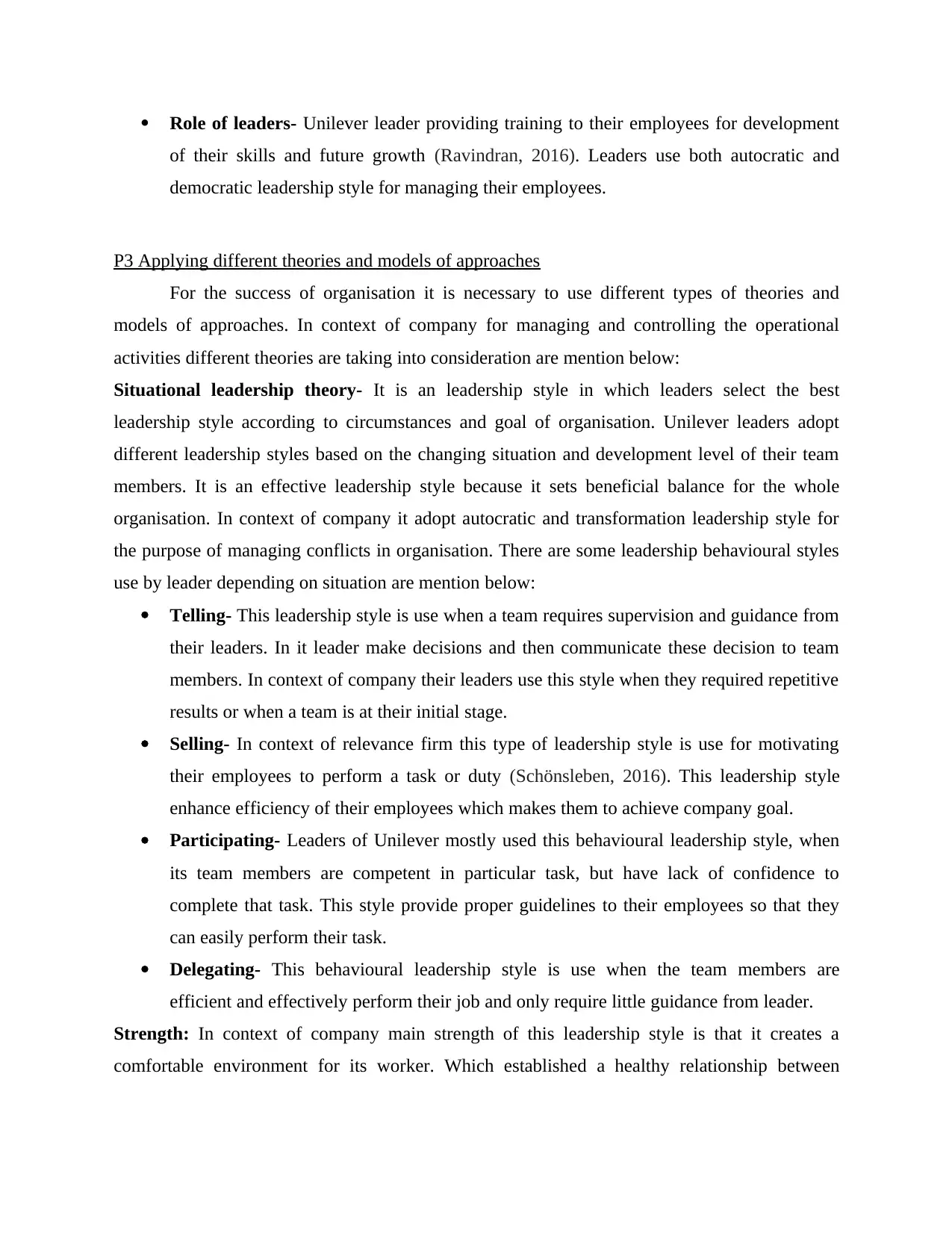
Role of leaders- Unilever leader providing training to their employees for development
of their skills and future growth (Ravindran, 2016). Leaders use both autocratic and
democratic leadership style for managing their employees.
P3 Applying different theories and models of approaches
For the success of organisation it is necessary to use different types of theories and
models of approaches. In context of company for managing and controlling the operational
activities different theories are taking into consideration are mention below:
Situational leadership theory- It is an leadership style in which leaders select the best
leadership style according to circumstances and goal of organisation. Unilever leaders adopt
different leadership styles based on the changing situation and development level of their team
members. It is an effective leadership style because it sets beneficial balance for the whole
organisation. In context of company it adopt autocratic and transformation leadership style for
the purpose of managing conflicts in organisation. There are some leadership behavioural styles
use by leader depending on situation are mention below:
Telling- This leadership style is use when a team requires supervision and guidance from
their leaders. In it leader make decisions and then communicate these decision to team
members. In context of company their leaders use this style when they required repetitive
results or when a team is at their initial stage.
Selling- In context of relevance firm this type of leadership style is use for motivating
their employees to perform a task or duty (Schönsleben, 2016). This leadership style
enhance efficiency of their employees which makes them to achieve company goal.
Participating- Leaders of Unilever mostly used this behavioural leadership style, when
its team members are competent in particular task, but have lack of confidence to
complete that task. This style provide proper guidelines to their employees so that they
can easily perform their task.
Delegating- This behavioural leadership style is use when the team members are
efficient and effectively perform their job and only require little guidance from leader.
Strength: In context of company main strength of this leadership style is that it creates a
comfortable environment for its worker. Which established a healthy relationship between
of their skills and future growth (Ravindran, 2016). Leaders use both autocratic and
democratic leadership style for managing their employees.
P3 Applying different theories and models of approaches
For the success of organisation it is necessary to use different types of theories and
models of approaches. In context of company for managing and controlling the operational
activities different theories are taking into consideration are mention below:
Situational leadership theory- It is an leadership style in which leaders select the best
leadership style according to circumstances and goal of organisation. Unilever leaders adopt
different leadership styles based on the changing situation and development level of their team
members. It is an effective leadership style because it sets beneficial balance for the whole
organisation. In context of company it adopt autocratic and transformation leadership style for
the purpose of managing conflicts in organisation. There are some leadership behavioural styles
use by leader depending on situation are mention below:
Telling- This leadership style is use when a team requires supervision and guidance from
their leaders. In it leader make decisions and then communicate these decision to team
members. In context of company their leaders use this style when they required repetitive
results or when a team is at their initial stage.
Selling- In context of relevance firm this type of leadership style is use for motivating
their employees to perform a task or duty (Schönsleben, 2016). This leadership style
enhance efficiency of their employees which makes them to achieve company goal.
Participating- Leaders of Unilever mostly used this behavioural leadership style, when
its team members are competent in particular task, but have lack of confidence to
complete that task. This style provide proper guidelines to their employees so that they
can easily perform their task.
Delegating- This behavioural leadership style is use when the team members are
efficient and effectively perform their job and only require little guidance from leader.
Strength: In context of company main strength of this leadership style is that it creates a
comfortable environment for its worker. Which established a healthy relationship between
⊘ This is a preview!⊘
Do you want full access?
Subscribe today to unlock all pages.

Trusted by 1+ million students worldwide
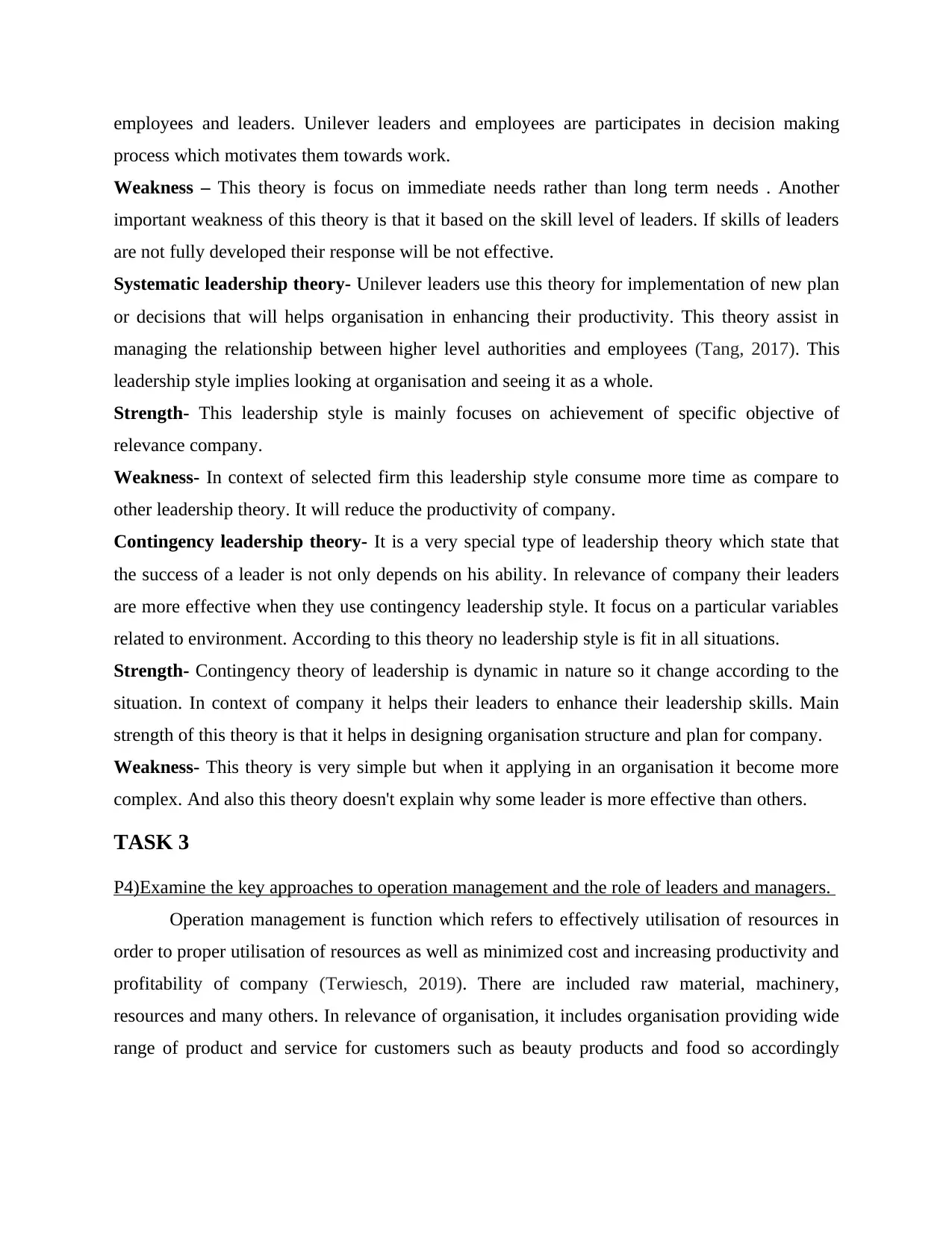
employees and leaders. Unilever leaders and employees are participates in decision making
process which motivates them towards work.
Weakness – This theory is focus on immediate needs rather than long term needs . Another
important weakness of this theory is that it based on the skill level of leaders. If skills of leaders
are not fully developed their response will be not effective.
Systematic leadership theory- Unilever leaders use this theory for implementation of new plan
or decisions that will helps organisation in enhancing their productivity. This theory assist in
managing the relationship between higher level authorities and employees (Tang, 2017). This
leadership style implies looking at organisation and seeing it as a whole.
Strength- This leadership style is mainly focuses on achievement of specific objective of
relevance company.
Weakness- In context of selected firm this leadership style consume more time as compare to
other leadership theory. It will reduce the productivity of company.
Contingency leadership theory- It is a very special type of leadership theory which state that
the success of a leader is not only depends on his ability. In relevance of company their leaders
are more effective when they use contingency leadership style. It focus on a particular variables
related to environment. According to this theory no leadership style is fit in all situations.
Strength- Contingency theory of leadership is dynamic in nature so it change according to the
situation. In context of company it helps their leaders to enhance their leadership skills. Main
strength of this theory is that it helps in designing organisation structure and plan for company.
Weakness- This theory is very simple but when it applying in an organisation it become more
complex. And also this theory doesn't explain why some leader is more effective than others.
TASK 3
P4)Examine the key approaches to operation management and the role of leaders and managers.
Operation management is function which refers to effectively utilisation of resources in
order to proper utilisation of resources as well as minimized cost and increasing productivity and
profitability of company (Terwiesch, 2019). There are included raw material, machinery,
resources and many others. In relevance of organisation, it includes organisation providing wide
range of product and service for customers such as beauty products and food so accordingly
process which motivates them towards work.
Weakness – This theory is focus on immediate needs rather than long term needs . Another
important weakness of this theory is that it based on the skill level of leaders. If skills of leaders
are not fully developed their response will be not effective.
Systematic leadership theory- Unilever leaders use this theory for implementation of new plan
or decisions that will helps organisation in enhancing their productivity. This theory assist in
managing the relationship between higher level authorities and employees (Tang, 2017). This
leadership style implies looking at organisation and seeing it as a whole.
Strength- This leadership style is mainly focuses on achievement of specific objective of
relevance company.
Weakness- In context of selected firm this leadership style consume more time as compare to
other leadership theory. It will reduce the productivity of company.
Contingency leadership theory- It is a very special type of leadership theory which state that
the success of a leader is not only depends on his ability. In relevance of company their leaders
are more effective when they use contingency leadership style. It focus on a particular variables
related to environment. According to this theory no leadership style is fit in all situations.
Strength- Contingency theory of leadership is dynamic in nature so it change according to the
situation. In context of company it helps their leaders to enhance their leadership skills. Main
strength of this theory is that it helps in designing organisation structure and plan for company.
Weakness- This theory is very simple but when it applying in an organisation it become more
complex. And also this theory doesn't explain why some leader is more effective than others.
TASK 3
P4)Examine the key approaches to operation management and the role of leaders and managers.
Operation management is function which refers to effectively utilisation of resources in
order to proper utilisation of resources as well as minimized cost and increasing productivity and
profitability of company (Terwiesch, 2019). There are included raw material, machinery,
resources and many others. In relevance of organisation, it includes organisation providing wide
range of product and service for customers such as beauty products and food so accordingly
Paraphrase This Document
Need a fresh take? Get an instant paraphrase of this document with our AI Paraphraser
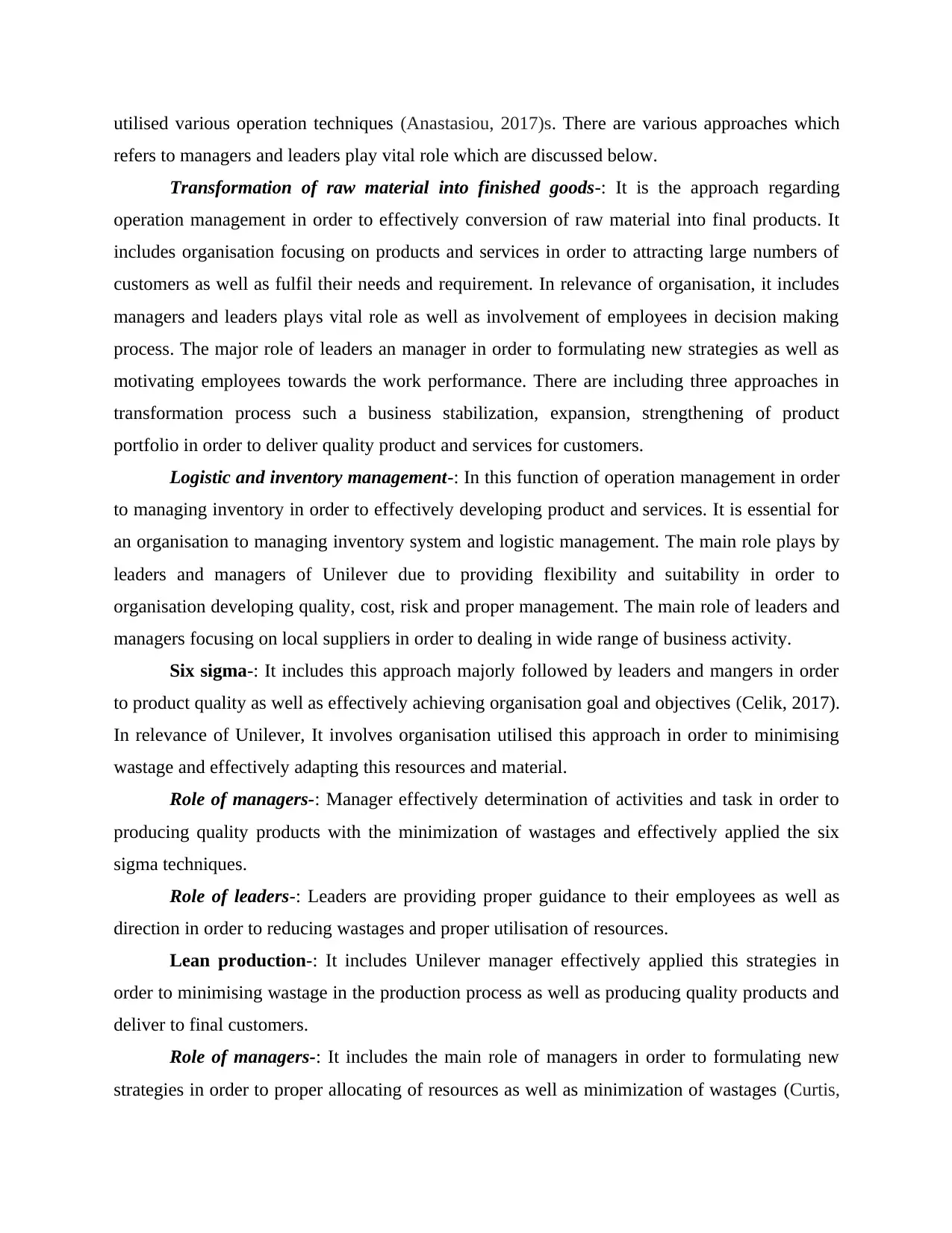
utilised various operation techniques (Anastasiou, 2017)s. There are various approaches which
refers to managers and leaders play vital role which are discussed below.
Transformation of raw material into finished goods-: It is the approach regarding
operation management in order to effectively conversion of raw material into final products. It
includes organisation focusing on products and services in order to attracting large numbers of
customers as well as fulfil their needs and requirement. In relevance of organisation, it includes
managers and leaders plays vital role as well as involvement of employees in decision making
process. The major role of leaders an manager in order to formulating new strategies as well as
motivating employees towards the work performance. There are including three approaches in
transformation process such a business stabilization, expansion, strengthening of product
portfolio in order to deliver quality product and services for customers.
Logistic and inventory management-: In this function of operation management in order
to managing inventory in order to effectively developing product and services. It is essential for
an organisation to managing inventory system and logistic management. The main role plays by
leaders and managers of Unilever due to providing flexibility and suitability in order to
organisation developing quality, cost, risk and proper management. The main role of leaders and
managers focusing on local suppliers in order to dealing in wide range of business activity.
Six sigma-: It includes this approach majorly followed by leaders and mangers in order
to product quality as well as effectively achieving organisation goal and objectives (Celik, 2017).
In relevance of Unilever, It involves organisation utilised this approach in order to minimising
wastage and effectively adapting this resources and material.
Role of managers-: Manager effectively determination of activities and task in order to
producing quality products with the minimization of wastages and effectively applied the six
sigma techniques.
Role of leaders-: Leaders are providing proper guidance to their employees as well as
direction in order to reducing wastages and proper utilisation of resources.
Lean production-: It includes Unilever manager effectively applied this strategies in
order to minimising wastage in the production process as well as producing quality products and
deliver to final customers.
Role of managers-: It includes the main role of managers in order to formulating new
strategies in order to proper allocating of resources as well as minimization of wastages (Curtis,
refers to managers and leaders play vital role which are discussed below.
Transformation of raw material into finished goods-: It is the approach regarding
operation management in order to effectively conversion of raw material into final products. It
includes organisation focusing on products and services in order to attracting large numbers of
customers as well as fulfil their needs and requirement. In relevance of organisation, it includes
managers and leaders plays vital role as well as involvement of employees in decision making
process. The major role of leaders an manager in order to formulating new strategies as well as
motivating employees towards the work performance. There are including three approaches in
transformation process such a business stabilization, expansion, strengthening of product
portfolio in order to deliver quality product and services for customers.
Logistic and inventory management-: In this function of operation management in order
to managing inventory in order to effectively developing product and services. It is essential for
an organisation to managing inventory system and logistic management. The main role plays by
leaders and managers of Unilever due to providing flexibility and suitability in order to
organisation developing quality, cost, risk and proper management. The main role of leaders and
managers focusing on local suppliers in order to dealing in wide range of business activity.
Six sigma-: It includes this approach majorly followed by leaders and mangers in order
to product quality as well as effectively achieving organisation goal and objectives (Celik, 2017).
In relevance of Unilever, It involves organisation utilised this approach in order to minimising
wastage and effectively adapting this resources and material.
Role of managers-: Manager effectively determination of activities and task in order to
producing quality products with the minimization of wastages and effectively applied the six
sigma techniques.
Role of leaders-: Leaders are providing proper guidance to their employees as well as
direction in order to reducing wastages and proper utilisation of resources.
Lean production-: It includes Unilever manager effectively applied this strategies in
order to minimising wastage in the production process as well as producing quality products and
deliver to final customers.
Role of managers-: It includes the main role of managers in order to formulating new
strategies in order to proper allocating of resources as well as minimization of wastages (Curtis,
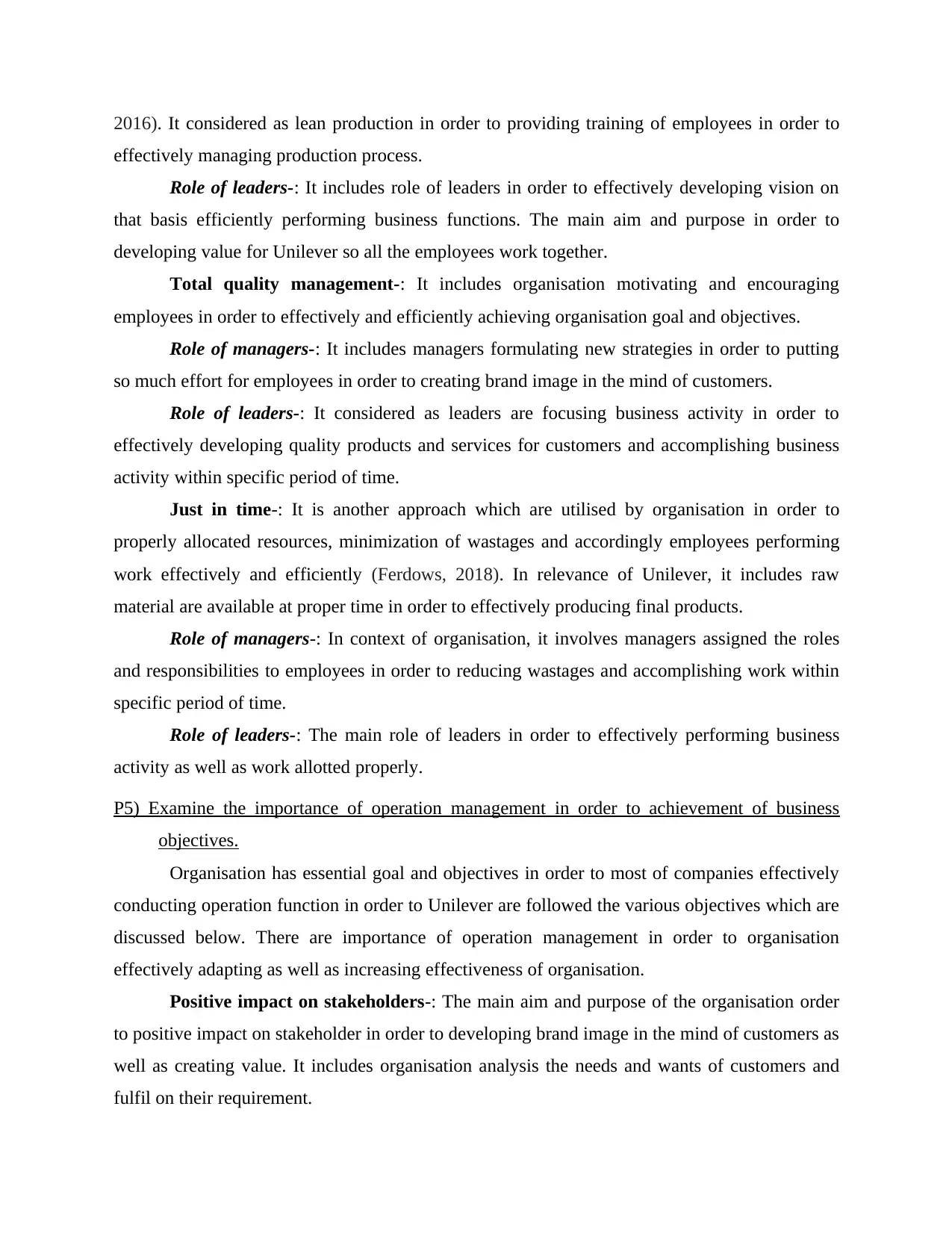
2016). It considered as lean production in order to providing training of employees in order to
effectively managing production process.
Role of leaders-: It includes role of leaders in order to effectively developing vision on
that basis efficiently performing business functions. The main aim and purpose in order to
developing value for Unilever so all the employees work together.
Total quality management-: It includes organisation motivating and encouraging
employees in order to effectively and efficiently achieving organisation goal and objectives.
Role of managers-: It includes managers formulating new strategies in order to putting
so much effort for employees in order to creating brand image in the mind of customers.
Role of leaders-: It considered as leaders are focusing business activity in order to
effectively developing quality products and services for customers and accomplishing business
activity within specific period of time.
Just in time-: It is another approach which are utilised by organisation in order to
properly allocated resources, minimization of wastages and accordingly employees performing
work effectively and efficiently (Ferdows, 2018). In relevance of Unilever, it includes raw
material are available at proper time in order to effectively producing final products.
Role of managers-: In context of organisation, it involves managers assigned the roles
and responsibilities to employees in order to reducing wastages and accomplishing work within
specific period of time.
Role of leaders-: The main role of leaders in order to effectively performing business
activity as well as work allotted properly.
P5) Examine the importance of operation management in order to achievement of business
objectives.
Organisation has essential goal and objectives in order to most of companies effectively
conducting operation function in order to Unilever are followed the various objectives which are
discussed below. There are importance of operation management in order to organisation
effectively adapting as well as increasing effectiveness of organisation.
Positive impact on stakeholders-: The main aim and purpose of the organisation order
to positive impact on stakeholder in order to developing brand image in the mind of customers as
well as creating value. It includes organisation analysis the needs and wants of customers and
fulfil on their requirement.
effectively managing production process.
Role of leaders-: It includes role of leaders in order to effectively developing vision on
that basis efficiently performing business functions. The main aim and purpose in order to
developing value for Unilever so all the employees work together.
Total quality management-: It includes organisation motivating and encouraging
employees in order to effectively and efficiently achieving organisation goal and objectives.
Role of managers-: It includes managers formulating new strategies in order to putting
so much effort for employees in order to creating brand image in the mind of customers.
Role of leaders-: It considered as leaders are focusing business activity in order to
effectively developing quality products and services for customers and accomplishing business
activity within specific period of time.
Just in time-: It is another approach which are utilised by organisation in order to
properly allocated resources, minimization of wastages and accordingly employees performing
work effectively and efficiently (Ferdows, 2018). In relevance of Unilever, it includes raw
material are available at proper time in order to effectively producing final products.
Role of managers-: In context of organisation, it involves managers assigned the roles
and responsibilities to employees in order to reducing wastages and accomplishing work within
specific period of time.
Role of leaders-: The main role of leaders in order to effectively performing business
activity as well as work allotted properly.
P5) Examine the importance of operation management in order to achievement of business
objectives.
Organisation has essential goal and objectives in order to most of companies effectively
conducting operation function in order to Unilever are followed the various objectives which are
discussed below. There are importance of operation management in order to organisation
effectively adapting as well as increasing effectiveness of organisation.
Positive impact on stakeholders-: The main aim and purpose of the organisation order
to positive impact on stakeholder in order to developing brand image in the mind of customers as
well as creating value. It includes organisation analysis the needs and wants of customers and
fulfil on their requirement.
⊘ This is a preview!⊘
Do you want full access?
Subscribe today to unlock all pages.

Trusted by 1+ million students worldwide
1 out of 16
Related Documents
Your All-in-One AI-Powered Toolkit for Academic Success.
+13062052269
info@desklib.com
Available 24*7 on WhatsApp / Email
![[object Object]](/_next/static/media/star-bottom.7253800d.svg)
Unlock your academic potential
Copyright © 2020–2026 A2Z Services. All Rights Reserved. Developed and managed by ZUCOL.





